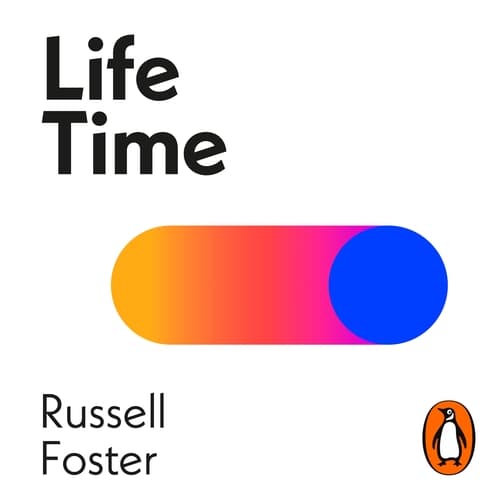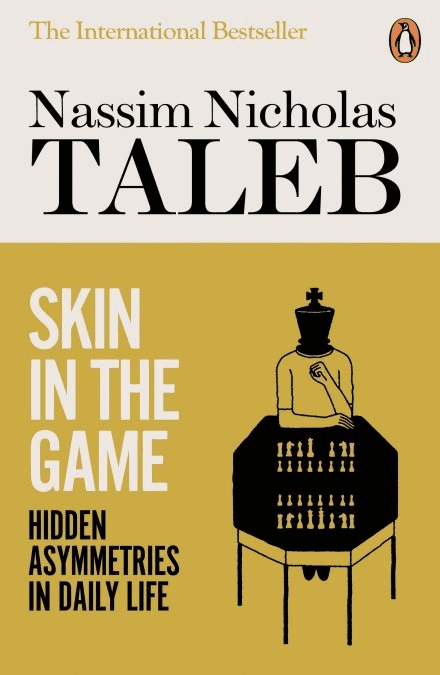Life Time by Russell Foster vs. Skin in the Game: Hidden Asymmetries in Daily Life
Life Time by Russell Foster
A book about the circadian rhythm. Apparently, it's really misunderstood, even by your doctor. Read this book to understand your body better. It helped me improve my sleep.
Skin in the Game: Hidden Asymmetries in Daily Life
Skin in the Game: Hidden Asymmetries in Daily Life is a nonfiction book by Nassim Nicholas Taleb, published in 2018. Taleb’s main point is pretty simple: people should share in the risks of the decisions they make. If you benefit from something, you should also face the downsides if things go wrong. He calls this having “skin in the game.” Without that, people can make reckless choices that hurt others while staying safe themselves. The book covers everything from politics and business to religion and everyday life. Taleb doesn’t hold back on criticism. He talks about how some policymakers and financial experts make decisions that affect millions but don’t suffer when those decisions backfire. He uses examples like bankers profiting during booms but getting bailed out during crashes. Taleb also goes after what he calls “Intellectual Yet Idiot” types—educated people who, in his view, complicate things and give advice without understanding real-world consequences. He argues that real k...


Reviews
Reviews
| Item | Votes | Upvote |
|---|---|---|
| No pros yet, would you like to add one? | ||
| Item | Votes | Upvote |
|---|---|---|
| No cons yet, would you like to add one? | ||
| Item | Votes | Upvote |
|---|---|---|
| Insightful and provocative arguments | 1 | |
| Applies to various aspects of life | 1 | |
| Engaging and accessible writing style | 1 | |
| A sensible approach to ethics | 1 |
| Item | Votes | Upvote |
|---|---|---|
| Some arguments can be repetitive | 1 | |
| Taleb's confrontational tone may not appeal to everyone | 1 |
Frequently Asked Questions
'Life Time' focuses specifically on the circadian rhythm and improving sleep, making it highly beneficial for readers looking to enhance their understanding of sleep patterns and health. In contrast, 'Skin in the Game' addresses broader themes of ethics and decision-making, emphasizing personal risk and accountability. If your primary goal is to improve sleep, 'Life Time' would be more beneficial, while 'Skin in the Game' is better suited for those interested in ethical decision-making.
'Skin in the Game' offers practical insights into ethics and decision-making that can be applied across various aspects of life, making it a versatile read for those interested in accountability and personal investment. On the other hand, 'Life Time' is more specialized, focusing on the science of sleep and circadian rhythms. If you're looking for a book that applies to a wide range of life situations, 'Skin in the Game' may be more practical, while 'Life Time' is ideal for those specifically seeking to improve their sleep.
'Skin in the Game' is noted for its engaging and accessible writing style, making complex ideas easier to understand. 'Life Time' may also be well-written, but it primarily focuses on scientific concepts related to sleep. Readers looking for a more provocative and engaging narrative may prefer 'Skin in the Game', while those interested in a straightforward exploration of sleep science might find 'Life Time' appealing.
'Life Time' by Russell Foster is a comprehensive book that delves into the circadian rhythm, which is often misunderstood, even by medical professionals. The book aims to help readers understand their bodies better and provides insights on how to improve sleep patterns.
Russell Foster is a renowned neuroscientist and professor known for his research in circadian rhythms. He has authored several publications and books aimed at helping people understand the science behind sleep and biological clocks.
Currently, there are no user-generated pros and cons for 'Life Time' by Russell Foster.
'Skin in the Game: Hidden Asymmetries in Daily Life' is a nonfiction book by Nassim Nicholas Taleb that argues people should share in the risks of their decisions. Taleb emphasizes that if someone benefits from a decision, they should also face the potential downsides. The book critiques various sectors, including politics and finance, highlighting how decision-makers often escape the consequences of their actions. It explores themes of accountability and the importance of real-world experience over theoretical knowledge.
Nassim Nicholas Taleb is a Lebanese-American essayist, scholar, and statistician known for his work on risk, uncertainty, and decision-making. He is the author of several influential books, including 'The Black Swan' and 'Antifragile.' Taleb's writing often critiques conventional wisdom and emphasizes the importance of practical experience in understanding complex systems.
Pros of 'Skin in the Game' include its insightful and provocative arguments, applicability to various aspects of life, engaging writing style, and a sensible approach to ethics. However, some cons are that certain arguments can be repetitive, and Taleb's confrontational tone may not appeal to everyone.
The main themes of 'Skin in the Game' include accountability, the importance of sharing risks in decision-making, the critique of policymakers and financial experts who evade consequences, and the influence of stubborn minorities on societal choices. Taleb also discusses the concept of real knowledge being derived from practical experience rather than theoretical understanding.
Nassim Nicholas Taleb's writing style in 'Skin in the Game' is direct and sometimes blunt. He is known for his no-nonsense approach, which some readers appreciate for its clarity and honesty, while others may find it overly combative or confrontational.



















